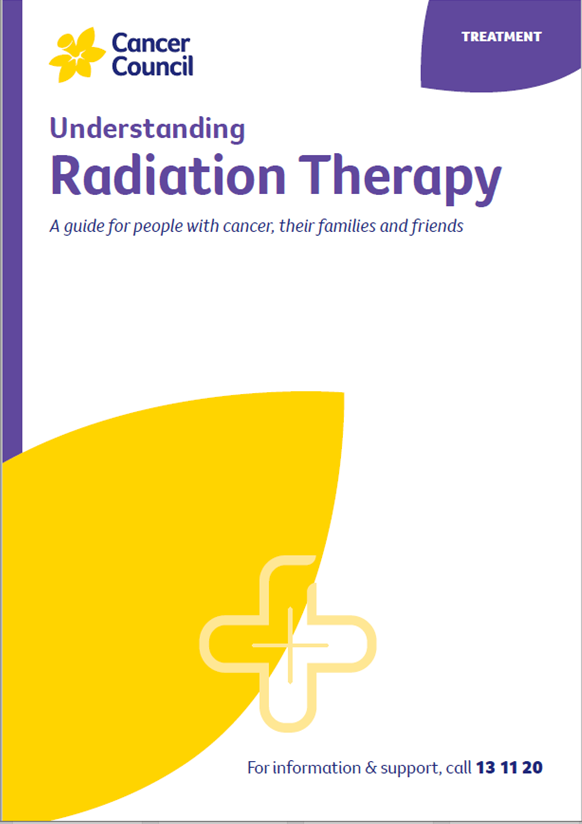- Home
- Vaginal cancer
- Treatment
- Radiation therapy
Radiation therapy for vaginal cancer
Also known as radiotherapy, this treatment uses a controlled dose of radiation to kill or damage cancer cells. The radiation is usually from x-ray beams.
Learn more about:
- Overview
- How is it given?
- External radiation therapy (EBRT)
- Internal radiation therapy (brachytherapy)
- Video: What is radiation therapy?
Overview
Radiation therapy is the main treatment for vaginal cancer because vaginal cancer that is close to the urethra, bladder and rectum is often difficult to remove surgically. You may have radiation therapy on its own or combined with chemotherapy.
If you have surgery, you may have radiation therapy afterwards to destroy any remaining cancer cells and reduce the risk of the cancer coming back.
How is it given?
There are 2 main ways of delivering radiation therapy: externally and internally. It is common to have both types to treat vaginal cancer. Your radiation oncologist will recommend the course of treatment most suitable for you, and explain what to expect and possible side effects.
For more on this, see our general section on Radiation therapy.
External beam radiation therapy (EBRT)
In EBRT, a machine precisely directs radiation beams from outside the body to the affected areas of the pelvis. You will lie on a treatment table under the radiation machine. Each treatment session takes around 10–15 minutes and is painless. For more on this, see our general section on External beam radiation therapy.
EBRT for vaginal cancer is usually given daily, Monday to Friday, over 4–6 weeks. The exact number of treatment sessions you have will depend on the type and size of the cancer, and whether it has spread to the lymph nodes.
See also Managing side effects.
Internal radiation therapy (brachytherapy)
Brachytherapy delivers radiation directly to the tumour from inside your body. It is usually given after you have finished having EBRT. Brachytherapy uses a small amount of radioactive material, called a source, to deliver the radiation. There are different ways to have brachytherapy, depending on the size of the cancer after EBRT.
For more on this, see our general section on Brachytherapy.
Intracavity brachytherapy
| used for | small tumours that only involve a thin layer of vaginal tissue |
| where done | usually given during day visits to a hospital or treatment centre as an outpatient |
| how done |
|
| how long |
|
Interstitial brachytherapy
| used for | cancers that are still quite thick after you have finished having EBRT |
| where done | you will be admitted to hospital; not provided at all hospitals so you may have to travel for treatment |
| how done |
|
| how long |
|
After brachytherapy, you may feel uncomfortable in the vaginal region. Pain medicines can help if needed. You may have some vaginal discharge or bleeding for a few days. To reduce the risk of infection, use sanitary pads, not tampons. See also Managing side effects.
→ READ MORE: Surgery for vaginal cancer
Video: What is radiation therapy?
More resources
Prof Alison Brand, Director, Gynaecological Oncology, Westmead Hospital, NSW; Gemma Busuttil, Radiation Therapist, Crown Princess Mary Cancer Centre, Westmead Hospital, NSW; Kim Hobbs, Clinical Specialist Social Worker, Gynaecological Cancer, Westmead Hospital, NSW; Dr Ming-Yin Lin, Radiation Oncologist, Peter MacCallum Cancer Centre, VIC; Dr Lisa Mackenzie, Clinical Psychologist Registrar, HNE Centre for Gynaecological Cancer, Hunter New England Local Health District, NSW; Anne Mellon, CNC – Gynaecological Oncology, HNE Centre for Gynaecological Cancer, Hunter New England Local Health District, NSW; A/Prof Tarek Meniawy, Medical Oncologist, Sir Charles Gairdner Hospital and The University of Western Australia, WA; Dr Archana Rao, Gynaecological Oncologist, Senior Staff Specialist, Royal Brisbane and Women’s Hospital, QLD; Tara Redemski, Senior Physiotherapist – Cancer and Blood Disorders, Gold Coast University Hospital, QLD; Angela Steenholdt, Consumer; Maria Veale, 13 11 20 Consultant, Cancer Council QLD.
View the Cancer Council NSW editorial policy.
View all publications or call 13 11 20 for free printed copies.
Need to talk?
Support services
Coping with cancer?
Speak to a health professional or to someone who has been there, or find a support group or forum
Looking for transport, accommodation or home help?
Practical advice and support during and after treatment
Cancer information
Common questions about radiation therapy
Key questions about radiation therapy as part of cancer treatment
Resource hub
Guides, fact sheets, videos, podcasts and more for people with cancer, their families and friends

